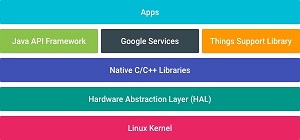News
Android Things Developer Preview Released
- By David Ramel
- August 14, 2017
While the mobile dev world awaits the imminent release of Android O, Google's flagship mobile OS, the company released a new developer preview for its Internet of Things (IoT) offering.
The new Android Things developer preview, used for developing connected embedded devices, is the first one to be based on Android O.
"Android Things development is very similar to traditional Android mobile development and involves writing apps using the Android framework and tools," Google says in its SDK preview documentation. "All you need is a development board flashed with the Android Things OS and the required peripherals for your device."
In a blog post earlier this month, Google explained that the Android Things preview includes major changes coming with Android O.
"Android O is currently under Developer Preview for phones and tablets, and DP5 [Developer Preview 5] is now based on this upcoming release (previous releases were based on Android N)," the company said. "This means that your future Android Things applications should target API 26 to work correctly on the platform with our support libraries."
 [Click on image for larger view.]
Android Things Platform Architecture (source: Google)
[Click on image for larger view.]
Android Things Platform Architecture (source: Google)
Google highlighted hardware changes, with new device support added, improvements to API features and the newly available Android Things Console (requires Google account). Speaking of the latter, Google said, "We have recently made a number of UX improvements to the console to improve usability and functionality. DP5 is now available within the Android Things Console, but the DP5 update will not be pushed automatically to devices without your intervention. You will need to update your application for DP5, then create a new update and push it via the console yourself."
Of the hardware changes, Google said, "An important goal of Android Things is to help developers seamlessly scale from prototype to production. When we exit Developer Preview, we will differentiate between hardware platforms targeted for prototyping-only and hardware reference designs that can scale to production. Production-ready hardware will satisfy Google's security requirements and include long term support from the silicon manufacturers. We will have more to share later on."
About the Author
David Ramel is an editor and writer at Converge 360.